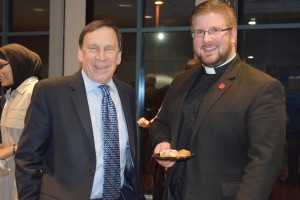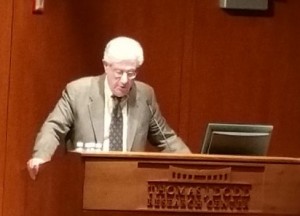The 36th Anniversary Celebration of the establishment of the Center for Judaic Studies and Contemporary Jewish Life was held on Sunday, November 15, in the Konover Auditorium followed by a reception. A panel discussion featuring three of the program’s alumni as well as Professors Arnold Dashefsky and Stuart Miller was followed by an address from Professor David Ruderman, Joseph Meyerhoff Professor of Modern Jewish History at the University of Pennsylvania and former director of Penn’s Katz Center for Advanced Judaic Studies.
The festive event celebrated the accomplishments and milestones of the Center and was an opportunity to thank and highlight all those who made the success of the program possible. Former director and founder of the Center, Professor Arnold Dashefsky, shared the history of the Center and its accomplishments while Academic Director, Professor Stuart Miller, discussed the exciting future of the program. Three highly distinguished alumni students expressed their gratitude to the program and provided inspirational accounts of what they had learned and how the program had impacted their lives. Renowned Professor David Ruderman presented an overview of the development of the field of Judaic Studies over the past 40 years.
The Center for Judaic Studies and Contemporary Jewish Life was the first Judaic Studies center to be established in the state of Connecticut in 1979. Former director, Arnold Dashefsky, described the Center’s inaugural event which featured keynote speaker Nobel Prize winner Isaac Bashevis Singer and which was attended by over 1,000 people. Since 1979, the Center has established the M.A. in Judaic Studies, the Israel Study Program, the academic convocation on  the Holocaust, and archeological digs in Sepphoris, Israel, and, more recently, in Chesterfield, CT. Guest speakers have included Nobel Laureates such as Elie Wiesel. Hebrew and Judaic Studies (HEJS) has been created as a section within the department of Literatures, Cultures, and Languages; and, as Academic Director Stuart Miller announced, the B.A. in Judaic Studies has been approved by the College of Liberal Arts and Sciences and will likely be offered in the fall. Until now, undergraduates interested in the degree have pursued it through the individualized major program.
the Holocaust, and archeological digs in Sepphoris, Israel, and, more recently, in Chesterfield, CT. Guest speakers have included Nobel Laureates such as Elie Wiesel. Hebrew and Judaic Studies (HEJS) has been created as a section within the department of Literatures, Cultures, and Languages; and, as Academic Director Stuart Miller announced, the B.A. in Judaic Studies has been approved by the College of Liberal Arts and Sciences and will likely be offered in the fall. Until now, undergraduates interested in the degree have pursued it through the individualized major program.
With four full-time senior faculty devoted to teaching courses in Judaic Studies, which includes UConn-Stamford’s Center for Judaic and Middle Eastern Studies director Nehama Aschkenasy, the program now provides courses from the ancient period to the modern taught by experts in the field. Not only does the HEJS section provide this stable continuum, but the Center’s greatest strength, as Professor Miller described, is its integration within the University so that courses from a myriad of departments, from sociology to political science, are cross-listed with Judaic Studies, allowing students in the program to gain a wide knowledge base and academic perspective and also exposing students in other programs and departments to Jewish Studies. As Professor Miller notes, the Judaic Studies program has become truly interdisciplinary.
While the interdisciplinary aspects of the program were acknowledged, it was the individualized guidance and personal relationships between the instructors of Judaic Studies and their students that elicited the highest praise from the alumni panel. The alumni speakers credited the Center’s professors with forging mentoring relationships that impacted their academic careers.
Professor David Grossberg completed the M.A. in Judaic Studies at UConn in 2010 before moving on to Princeton and obtaining a PhD in Religions of Late Antiquity. He is now a visiting scholar at Cornell University teaching Intro to Judaism and writing his first book. Professor Grossberg attributed the opportunity at UConn to research, teach Hebrew, and publish his master’s thesis to being well prepared for PhD study and to being accepted to programs at Harvard, Princeton, NYU, and Boston University.
Similarly, Reverend Thomas Drobena, now a Lutheran Pastor, achieved the Master of Divinity from Yale Divinity School after earning the Master of Judaic Studies at UConn in 2012 and is now completing a Master of Sacred Theology at Yale. Pastor Drobena studied in Slovakia at the Lutheran School of Theology, and after three semesters studying abroad, came to Storrs to complete the B.A. Reverend Drobena credited Professor Miller with taking an interest in him as an undergraduate and bringing him into the cohort of graduate students studying rabbinic literature at the time. Drobena expressed gratitude to the Center for helping him to grow as a scholar by studying texts from a Jewish perspective.
Naila Razzaq, too, expressed her appreciate for the Center and described her experiences as an undergraduate in the program as a defining time in her life where she grew to become an emerging scholar. Naila was an honors student at UConn who won numerous awards and accolades. Naila completed the individualized major in Judaic Studies and participated in the University Scholar Program, one of the most prestigious programs for undergraduates at UConn. After completing many of the courses in the Judaic Studies program, Naila was inspired to study Second Temple Judaism and is now working towards the Master of Divinity at Yale Divinity School. Naila attributed the close relationships she had to her professors in Judaic Studies to guiding her through her academic career and shaping her intellectual development.
Professor David Ruderman, who has taught in the field of Judaic Studies for more than forty years and is former director of the Katz Center at the University of Pennsylvania, offered his view of the remarkable rise of Jewish Studies programs across the nation and internationally. Due to generous gifts and donations as well as support from the Jewish community, Jewish Studies has evolved from fledgling programs where there was little job security to large departments at various universities. Scholars in Jewish Studies are now integrated throughout academia. As Professor Ruderman noted, Jewish Studies “programs have grown and flourished” to the point that “we are speaking about a worldwide network of scholars in the thousands who are writing, who are thinking, who are creating in Jewish learning in ways as never before—unprecedented in Jewish history.”
Professor Ruderman concluded by speaking of the power of great Jewish S tudies professors to shape their students by placing Jewish Studies into the context of other academic studies, “transforming those with whom they are in contact and being transformed by the values, norms, and issues that challenge all humanities and social science scholars and their students.” Professor Ruderman acknowledged the crucial role of Judaic Studies instructors in ensuring the legacy of Jewish Studies. The alumni who spoke stand as a testament to the continuing fulfillment of that legacy at the Center for Judaic Studies and Contemporary Jewish Life at UConn.
tudies professors to shape their students by placing Jewish Studies into the context of other academic studies, “transforming those with whom they are in contact and being transformed by the values, norms, and issues that challenge all humanities and social science scholars and their students.” Professor Ruderman acknowledged the crucial role of Judaic Studies instructors in ensuring the legacy of Jewish Studies. The alumni who spoke stand as a testament to the continuing fulfillment of that legacy at the Center for Judaic Studies and Contemporary Jewish Life at UConn.